中国散文的英语翻译阅读
2016翻译硕士复习资料:英译中国现代散文选(3)
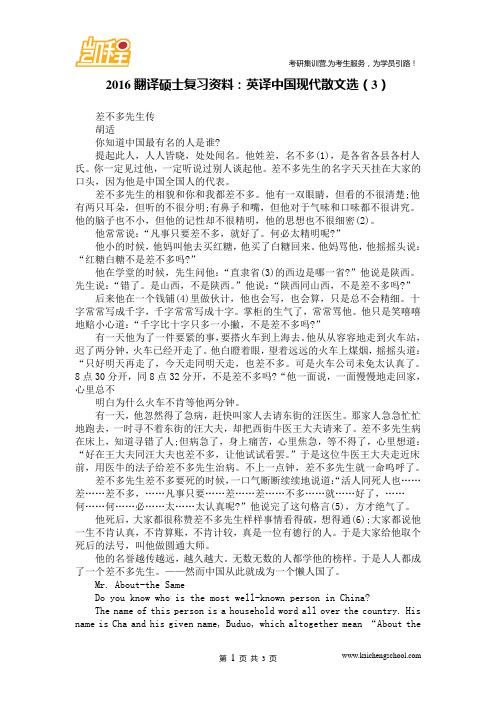
2016翻译硕士复习资料:英译中国现代散文选(3)差不多先生传胡适你知道中国最有名的人是谁?提起此人,人人皆晓,处处闻名。
他姓差,名不多(1),是各省各县各村人氏。
你一定见过他,一定听说过别人谈起他。
差不多先生的名字天天挂在大家的口头,因为他是中国全国人的代表。
差不多先生的相貌和你和我都差不多。
他有一双眼睛,但看的不很清楚;他有两只耳朵,但听的不很分明;有鼻子和嘴,但他对于气味和口味都不很讲究。
他的脑子也不小,但他的记性却不很精明,他的思想也不很细密(2)。
他常常说:“凡事只要差不多,就好了。
何必太精明呢?”他小的时候,他妈叫他去买红糖,他买了白糖回来。
他妈骂他,他摇摇头说:“红糖白糖不是差不多吗?”他在学堂的时候,先生问他:“直隶省(3)的西边是哪一省?”他说是陕西。
先生说:“错了。
是山西,不是陕西。
”他说:“陕西同山西,不是差不多吗?”后来他在一个钱铺(4)里做伙计,他也会写,也会算,只是总不会精细。
十字常常写成千字,千字常常写成十字。
掌柜的生气了,常常骂他。
他只是笑嘻嘻地赔小心道:“千字比十字只多一小撇,不是差不多吗?”有一天他为了一件要紧的事,要搭火车到上海去。
他从从容容地走到火车站,迟了两分钟,火车已经开走了。
他白瞪着眼,望着远远的火车上煤烟,摇摇头道:“只好明天再走了,今天走同明天走,也差不多。
可是火车公司未免太认真了。
8点30分开,同8点32分开,不是差不多吗?“他一面说,一面慢慢地走回家,心里总不明白为什么火车不肯等他两分钟。
有一天,他忽然得了急病,赶快叫家人去请东街的汪医生。
那家人急急忙忙地跑去,一时寻不着东街的汪大夫,却把西街牛医王大夫请来了。
差不多先生病在床上,知道寻错了人;但病急了,身上痛苦,心里焦急,等不得了,心里想道:“好在王大夫同汪大夫也差不多,让他试试看罢。
”于是这位牛医王大夫走近床前,用医牛的法子给差不多先生治病。
不上一点钟,差不多先生就一命呜呼了。
差不多先生差不多要死的时候,一口气断断续续地说道:“活人同死人也……差……差不多,……凡事只要……差……差……不多……就……好了,……何……何……必……太……太认真呢?”他说完了这句格言(5),方才绝气了。
英语散文翻译带注释

英语散文翻译带注释Title: A Reflection on the Importance of Education in Modern Society。
Education is a crucial element in modern society. It plays an instrumental role in shaping the future of individuals, communities, and nations. In this reflective essay, I will explore the importance of education in our contemporary world and discuss the challenges and opportunities that come with it.Firstly, education is essential for personal and professional growth. It equips individuals with the necessary knowledge and skills to succeed in various fields of work. Education also helps individuals to developcritical thinking, problem-solving, and decision-making skills, which are crucial for navigating the complexities of modern life. Moreover, education fosters creativity, innovation, and entrepreneurship, which are essential for driving economic growth and social progress.Secondly, education is crucial for social and cultural development. It helps individuals to understand and appreciate diverse cultures, traditions, and perspectives. Education also promotes social cohesion, tolerance, and respect for human rights and dignity. It enablesindividuals to participate in democratic processes, engagein civic activities, and contribute to the development of their communities and societies.However, despite its importance, education facesseveral challenges in our contemporary world. One of the significant challenges is inequality in access to education. Millions of children and young people worldwide are still denied access to quality education due to poverty, discrimination, conflict, and other factors. Thisinequality perpetuates social and economic disparities and undermines the potential of individuals and societies to thrive.Another challenge is the quality of education. While access to education is crucial, it is equally important toensure that the education provided is of high quality. Many education systems worldwide struggle to provide quality education due to inadequate resources, outdated curricula, and ineffective teaching methods. This situation hinders the development of critical thinking, creativity, and innovation, and limits the potential of individuals and societies to succeed.Furthermore, education faces the challenge of relevance in the face of rapid technological advancements and changing social and economic realities. The education systems of many countries are still based on outdated models that do not adequately prepare individuals for the demands of the modern world. There is a need to re-think and re-design education systems to ensure that they are relevant, flexible, and responsive to the needs of individuals and societies.Despite these challenges, education also presents significant opportunities for individuals and societies. The digital revolution has opened up new possibilities for learning, collaboration, and innovation. Online learningplatforms, mobile applications, and other technological tools have made education more accessible, flexible, and personalized. Moreover, education can be a powerful toolfor promoting sustainable development, addressing global challenges such as climate change, poverty, and inequality.In conclusion, education is a critical element in modern society. It is essential for personal and professional growth, social and cultural development, and economic and social progress. However, education also faces significant challenges, including inequality in access, quality, and relevance. To fully realize the potential of education, individuals, communities, and nations must work together to address these challenges and seize the opportunities presented by education.。
英语散文阅读带翻译
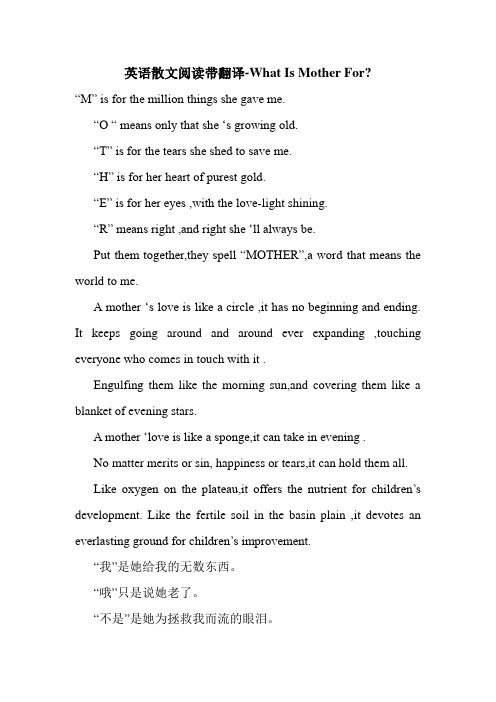
英语散文阅读带翻译-What Is Mother For?“M” is for the million things she gave me.“O “ means only that she ‘s growing old.“T” is for the tears she shed to save me.“H” is for her heart of purest gold.“E” is for her eyes ,with the love-light shining.“R” means right ,and right she ‘ll always be.Put them together,they spell “MOTHER”,a word that means the world to me.A mother ‘s love is like a circle ,it has no beginning and ending. It keeps going around and around ever expanding ,touching everyone who comes in touch with it .Engulfing them like the morning sun,and covering them like a blanket of evening stars.A mother ‘love is like a sponge,it can take in evening .No matter merits or sin, happiness or tears,it can hold them all.Like oxygen on the plateau,it offers the nutrient for children’s development. Like the fertile soil in the basin plain ,it devotes an everlasting ground for children’s improvement.“我”是她给我的无数东西。
经典散文英语短篇附中文翻译

经典散文英语短篇附中文翻译中国六朝以来,为区别韵文与骈文,把凡不押韵、不重排偶的散体文章(包括经传史书),统称“散文”。
后又泛指诗歌以外的所有文学体裁。
今天为大家奉上经典散文英语短篇,时间难得,何不深入了解一下让自己的收获更多呢?经典散文英语短篇(一)转眼青春的散场青春的字眼慢慢的觉得陌生,年轮总是很轻易的烙下苍老的印记。
以为总是长久的东西,其实,就在转神与刹那间便不在身边了。
曾经深爱、思念着的人便轻易的变成了曾经熟悉的陌生人。
曾经纯真无邪,曾经美丽梦想,随着四季轮回慢慢的散尽……这就是青春,在岁月里的转身,从一个熟悉到另外一个陌生,再从陌生转变到熟悉,直至一场场的青春的帷幕渐渐的落幕。
在青春的酸甜苦乐里稚气里的幻想慢慢的褪去。
“Youth” seems to be fading away in my life, only leaving me some unforgettable and cherished memories. Something that we used to think would last forever in our lives, had actually vanished in a second before we realized it. Those who we used to deeply love or miss, have now become the most acquainted strangers. Our once pure and beautiful dream, is gradually fading away with time passing by……This is youth, which is indeed an endless cycle from familiarity to strangeness, and from strangeness to familiarity, until the curtain of our youth is closing off little by little, along with our childish fantasies.人就是这样一种奇怪的动物,拥有的时候厌倦,失去回首的时候才酸痛。
美文赏析 萧乾《古城》- 摘自张培基《英译中国散文选》

美文赏析| 萧乾《古城》- 摘自张培基《英译中国散文选》初冬的天,灰黯而且低垂,简直把人压得吁不出一口气。
前天一场雪还给居民一些明朗,但雪后的景象可不堪了!峭寒的北风将屋檐瓦角的雪屑一起卷到空中,舞过一个圈子以后都极善选择地向路人脖颈里钻。
街道为恶作剧的阳光弄成泥淖,残雪上面画着片片践踏的痕迹。
It was early winter. The gloomy and low sky made one feel suffocating. A fall of snow a couple of days before had before had brought to the city dwellers a touch of brightness, but now what an ugly scene reigned! The raw wind sent the snow on the tiles along the eaves whirling in the air in tiny bits and adroitly making its way down the necks of the pedestrians by way of their collars. The streets had become slushy by exposure to the prankish sun, and the thawing snow was dotted with traces of footsteps.要点:1,” 初冬的天,灰黯而且低垂,简直把人压得吁不出一口气”译时分为两句,It was early winter. The gloomy and low sky made one feel suffocating.简洁恰当,是翻译时常用的手法。
2,“把人压得吁不出一口气” 即“使人感到窒息”,译为made one feel suffocating。
经典散文《Youth》的翻译作品

英语知识请大家跟我共同欣赏这篇优美的散文翻译作品:Youth is not a time of life; it is a state of mind; it is not a matter of rosy cheeks, red lips and supple knees; it is a matter of the will, a quality of the imagination, a vigor of the emotions; it is the freshness of the deep springs of life.青春不是年华,而是心境;青春不是桃面、丹唇、柔膝,而是深沉的意志,恢宏的想象,炙热的感情;青春是生命的深泉在涌流。
Youth means a temperamental predominance of courage over timidity, of the appetite for adventure over the love of ease. This often exists in a man of 60 more than a boy of 20. Nobody grows old merely by a number of years. We grow old by deserting our ideals.青春气贯长虹,勇锐盖过怯弱,进取压倒苟安。
如此锐气,二十后生而有之,六旬男子则更多见。
年岁有加,并非垂老,理想丢弃,方堕暮年。
Years may wrinkle the skin, but to give up enthusiasm wrinkles the soul. Worry, fear, self-distrust bows the heart and turns the spring back to dust.岁月悠悠,衰微只及肌肤;热忱抛却,颓废必致灵魂。
《匆匆》朱自清 散文英译版本
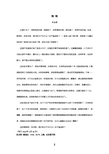
匆匆朱自清[1]燕子去了,有再来的时候;杨柳枯了,有再青的时候;桃花谢了,有再开的时候。
但是,聪明的,你告诉我,我们的日子为什么一去不复返呢?——是有人偷了他们罢:那是谁?又藏在何处呢?是他们自己逃走了罢:现在又到了那里呢?[2]我不知道他们给了我多少日子;但我的手确乎是渐渐空虚了。
在默默里算着,八千多日子已经从我手中溜去;像针尖上一滴水滴在大海里,我的日子滴在时间的流里,没有声音,也没有影子。
我不禁头涔涔而泪潸潸了。
[3]去的尽管去了,来的尽管来着;去来的中间,又怎样地匆匆呢?早上我起来的时候,小屋里射进两三方斜斜的太阳。
太阳他有脚啊,轻轻悄悄地挪移了;我也茫茫然跟着旋转。
于是——洗手的时候,日子从水盆里过去;吃饭的时候,日子从饭碗里过去;默默时,便从凝然的双眼前过去。
我觉察他去的匆匆了,伸出手遮挽时,他又从遮挽着的手边过去,天黑时,我躺在床上,他便伶伶俐俐地从我身上跨过,从我脚边飞去了。
等我睁开眼和太阳再见,这算又溜走了一日。
我掩着面叹息。
但是新来的日子的影儿又开始在叹息里闪过了。
[4]在逃去如飞的日子里,在千门万户的世界里的我能做些什么呢?只有徘徊罢了,只有匆匆罢了;在八千多日的匆匆里,除徘徊外,又剩些什么呢?过去的日子如轻烟,被微风吹散了,如薄雾,被初阳蒸融了;我留着些什么痕迹呢?我何曾留着像游丝样的痕迹呢?我赤裸裸来到这世界,转眼间也将赤裸裸的回去罢?但不能平的,为什么偏要白白走这一遭啊?[5]你聪明的,告诉我,我们的日子为什么一去不复返呢?(写于1922年3月18日)朱自清《踪迹》,1924:68-70 上海:亚东图书馆【译文一】Haste[1] The swallows may go, but they will return another day; the willows may wither, but they will turn green again; the peach blossoms may fade and fall, but they will bloom again. Y ou who are wiser than I, tell me, then: why is it that the days, once gone, never again return? Are they stolen by someone? Then, by whom? And where are they hidden? Or do they run away by themselves? Then, where are they now?[2] I do not know how many days I’ve been given, yet slowly but surely my supply is diminishing. Counting silently to myself, I can see that more than 8,000 of them have already slipped through my fingers, each like a drop of water on the head of a pin, falling into the ocean. My days are disappearing into the stream of time, noiselessly and without a trace; uncontrollably, my sweat and tears stream down.[3] What’s gone is gone, and what is coming cannot be halted. From what is gone to what is yet to come, why must it pass so quickly? In the morning when I get up there are two or three rays of sunlight slanting into my small room. The sun, does it have feet? Stealthily it moves along, as I too, unknowingly, follow its progress. Then as I wash up the day passes through my washbasin, and at breakfast through my rice bowl. When I am standing still and quiet my eyes carefully follow its progress past me. I can sense that it is hurrying along, and when I stretch out my hands to cover and hold it, it soon emerges from under my hands and moves along. At night, as I lie on my bed, agilely it strides across my body and flies past my feet. And when I open my eyes to greet the sun again, another day has slipped by. I bury my face in my hands and heave a sigh. But the shadow of the new day begins darting by, even in the midst of my sighing.[4] During these fleeting days what can I, only one among so many, accomplish? Nothing more than to pace irresolutely, nothing more than to hurry along. In these more than 8,000 days of hurrying what have I to show but some irresolute wanderings? The days that are gone are like smoke that has been dissipated by a breeze, like thin mists that have been burned off under the onslaught of the morning sun. What mark will I leave behind? Will the trace I leave behind be so much as a gossamer thread? Naked I came into this world, and in a twinkling still naked I will leave it. But what I cannot accept is: why shouldI make this journey in vain?[5] Y ou who are wiser than I, please tell me why it is that once gone, our days never return. (481 words)(Translated by Howard Goldblatt. Lau & Goldblatt, 1995: 625-626) (Translated by Howard Goldblatt. Joseph S. M. Lau & Howard Goldblatt (eds.). The Columbia Anthology of Modern Chinese Literature. New Y ork: Columbia University Press, 1995: 625-626)【译者简介】Howard Goldblatt, Research Professor of Chinese at the University of Notre Dame, USA., has taught modern Chinese literature and culture for more than a quarter of a century. He obtained his BA from Long Beach State College in 1961, MA from San Francisco State University in 1971, and PhD from Indiana University in 1974. As the foremost translator of modern and contemporary Chinese literature in the West, he has published English translations of over 40 volumes of Chinese fiction in translation to his name, including Mo Y an’s Red Sorghum, as well as several memoirs and a volume of poetry in translation. Goldblatt was awarded the Translation Center Robert Payne A ward (1985) and “Translation of the Y ear”(1999) given by the American Translators Association. He is also the founder and editor of the scholarly journal Modern Chinese Literature, and has contributed essays and articles to The W ashington Post, The Times of London, TIME Magazine,W orld Literature T oday, and The Los Angeles Times.【译文二】Transient Days[1] If swallows go away, they will come back again. If willows wither, they will turn green again. If peach blossoms fade, they will flower again. But, tell me, you the wise, why should our days go by never to return? Perhaps they have been stolen by someone. But who could it be and where could he hide them? Perhaps they have just run away by themselves. But where could they be at the present moment?[2] I don’t know how many days I am entitled to altogether, but my quota of them is und oubtedly wearing away. Counting up silently, I find that more than 8,000 days have already slipped away through my fingers. Like a drop of water falling off a needle point into the ocean, my days are quietly dripping into the stream of time without leaving a trace. At the thought of this, sweat oozes from my forehead and tears trickle down my cheeks.[3] What is gone is gone, what is to come keeps coming. How swift is the transition in between! WhenI get up in the morning, the slanting sun casts two or three squarish patches of light into my small room. The sun has feet too, edging away softly and stealthily. And, without knowing it, I am already caught in its revolution. Thus the day flows away through the sink when I wash my hands; vanishes in the rice bowl when I have my meal; passes away quietly before the fixed gaze of my eyes when I am lost in reverie.A ware of its fleeting presence, I reach out for it only to find it brushing past my outstretched hands. In the evening, when I lie on my bed, it nimbly strides over my body and flits past my feet. By the time when I open my eyes to meet the sun again, another day is already gone. I heave a sigh, my head buried in my hands. But, in the midst of my sighs, a new day is flashing past.[4] Living in this world with its fleeting days and teeming millions, what can I do but waver and wander and live a transient life? What have I been doing during the 8,000 fleeting days except wavering and wandering? The bygone days, like wisps of smoke, have been dispersed by gentle winds, and, like thin mists, have been evaporated by the rising sun. What traces have I left behind? No, nothing, not even gossamer-like traces. I have come to this world stark naked, and in the twinkling of an eye, I am to go back as stark naked as ever. However, I am taking it very much to heart: why should I be made to pass through this world for nothing at all?[5] O you the wise, would you tell me please: why should our days go by never to return? (475 words)(张培基译,1999:75-77) (张培基译,《英译中国现代散文选(汉、英对照)》,上海:上海外语教育出版社,1999:75-77)【译者简介】张培基,毕业于上海圣约翰大学英文系,曾任《上海自由西报》英文记者、《中国评论周报》(英文)特约撰稿人,后赴日本东京远东国际军事法庭任英语翻译,于美国印地安纳大学英国文学系肄业后回国。
经典散文的英语翻译
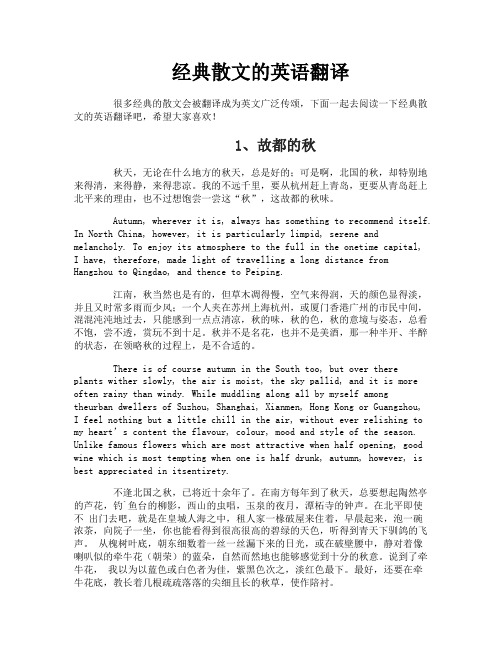
经典散文的英语翻译很多经典的散文会被翻译成为英文广泛传颂,下面一起去阅读一下经典散文的英语翻译吧,希望大家喜欢!1、故都的秋秋天,无论在什么地方的秋天,总是好的;可是啊,北国的秋,却特别地来得清,来得静,来得悲凉。
我的不远千里,要从杭州赶上青岛,更要从青岛赶上北平来的理由,也不过想饱尝一尝这“秋”,这故都的秋味。
Autumn, wherever it is, always has something to recommend itself. In North China, however, it is particularly limpid, serene and melancholy. To enjoy its atmosphere to the full in the onetime capital, I have, therefore, made light of travelling a long distance from Hangzhou to Qingdao, and thence to Peiping.江南,秋当然也是有的,但草木凋得慢,空气来得润,天的颜色显得淡,并且又时常多雨而少风;一个人夹在苏州上海杭州,或厦门香港广州的市民中间,混混沌沌地过去,只能感到一点点清凉,秋的味,秋的色,秋的意境与姿态,总看不饱,尝不透,赏玩不到十足。
秋并不是名花,也并不是美酒,那一种半开、半醉的状态,在领略秋的过程上,是不合适的。
There is of course autumn in the South too, but over thereplants wither slowly, the air is moist, the sky pallid, and it is more often rainy than windy. While muddling along all by myself amongtheurban dwellers of Suzhou, Shanghai, Xianmen, Hong Kong or Guangzhou, I feel nothing but a little chill in the air, without ever relishing to my heart’s content the flavour, colour, mood and style of the season. Unlike famous flowers which are most attractive when half opening, good wine which is most tempting when one is half drunk, autumn, however, is best appreciated in itsentirety.不逢北国之秋,已将近十余年了。
英语散文带翻译摘抄
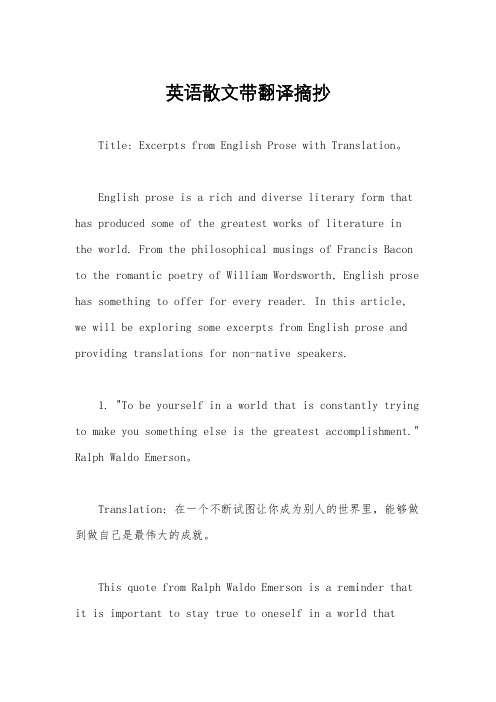
英语散文带翻译摘抄Title: Excerpts from English Prose with Translation。
English prose is a rich and diverse literary form that has produced some of the greatest works of literature in the world. From the philosophical musings of Francis Bacon to the romantic poetry of William Wordsworth, English prose has something to offer for every reader. In this article, we will be exploring some excerpts from English prose and providing translations for non-native speakers.1. "To be yourself in a world that is constantly trying to make you something else is the greatest accomplishment." Ralph Waldo Emerson。
Translation: 在一个不断试图让你成为别人的世界里,能够做到做自己是最伟大的成就。
This quote from Ralph Waldo Emerson is a reminder that it is important to stay true to oneself in a world thatoften tries to mold us into something we are not. Being authentic and genuine is a difficult task, but it is onethat is worth striving for.2. "It is not in the stars to hold our destiny but in ourselves." William Shakespeare。
英语翻译散文读书笔记
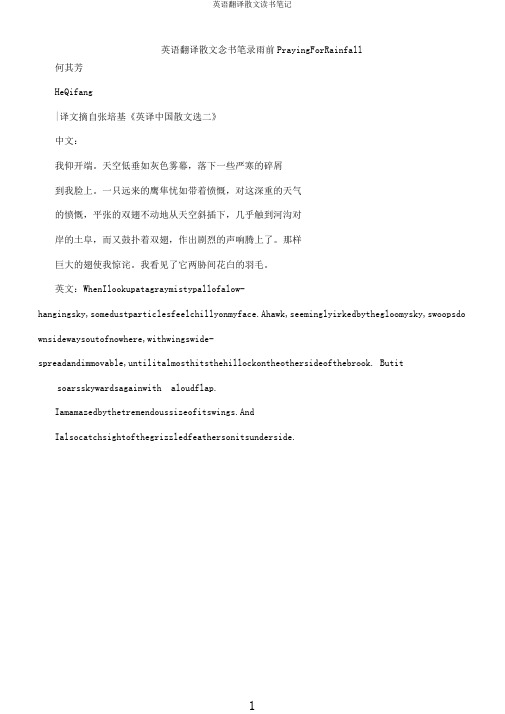
英语翻译散文念书笔录雨前PrayingForRainfall何其芳HeQifang|译文摘自张培基《英译中国散文选二》中文:我仰开端。
天空低垂如灰色雾幕,落下一些严寒的碎屑到我脸上。
一只远来的鹰隼忧如带着愤慨,对这深重的天气的愤慨,平张的双翅不动地从天空斜插下,几乎触到河沟对岸的土阜,而又鼓扑着双翅,作出剧烈的声响腾上了。
那样巨大的翅使我惊诧。
我看见了它两胁间花白的羽毛。
英文:WhenIlookupatagraymistypallofalow-hangingsky,somedustparticlesfeelchillyonmyface.Ahawk,seeminglyirkedbythegloomysky,swoopsdo wnsidewaysoutofnowhere,withwingswide-spreadandimmovable,untilitalmosthitsthehillockontheothersideofthebrook. Butit soarsskywardsagainwith aloudflap.Iamamazedbythetremendoussizeofitswings.AndIalsocatchsightofthegrizzledfeathersonitsunderside.重点:1,“天空低垂如灰色雾幕”译为agraymistypallof通alow–hangingsky, 等于alow-hangingskyresemblingagraymistypall.相同的栗子如:atoyofahouse=atoy-likehouse,adwarfofaman=adwarf–likeaman.2,”远来的“译为outofnowhere(不知从哪儿来的),常我们译为comingfromafar,但前者更加传神贴切。
3,“深重的天气”是一个移就修辞格的表达,作者把原来属于形容人的心情的“深重”转移到形容非生命的“天空”,译为thegloomysky,也能够参照第一段译为leadensky综述:在描绘“鹰“时,译者又运用了大批生动形象的动词。
2016翻译硕士复习资料:英译中国现代散文选(20)
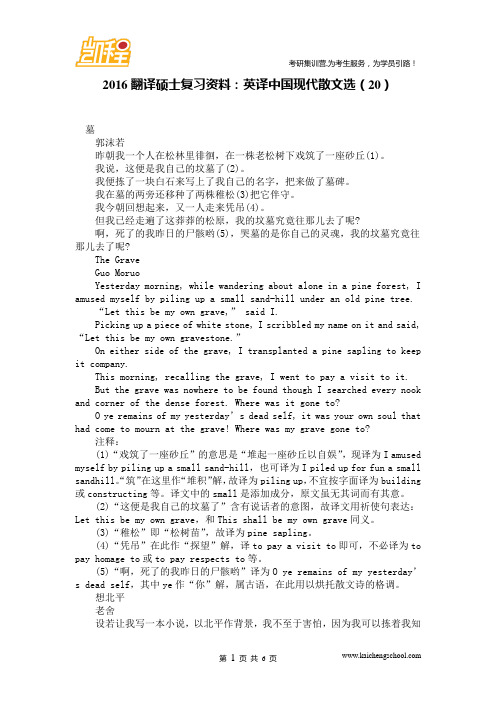
2016翻译硕士复习资料:英译中国现代散文选(20)墓郭沫若昨朝我一个人在松林里徘徊,在一株老松树下戏筑了一座砂丘(1)。
我说,这便是我自己的坟墓了(2)。
我便拣了一块白石来写上了我自己的名字,把来做了墓碑。
我在墓的两旁还移种了两株稚松(3)把它伴守。
我今朝回想起来,又一人走来凭吊(4)。
但我已经走遍了这莽莽的松原,我的坟墓究竟往那儿去了呢?啊,死了的我昨日的尸骸哟(5),哭墓的是你自己的灵魂,我的坟墓究竟往那儿去了呢?The GraveGuo MoruoYesterday morning, while wandering about alone in a pine forest, I amused myself by piling up a small sand-hill under an old pine tree.“Let this be my own grave,” said I.Picking up a piece of white stone, I scribbled my name on it and said, “Let this be my own gravestone.”On either side of the grave, I transplanted a pine sapling to keep it company.This morning, recalling the grave, I went to pay a visit to it.But the grave was nowhere to be found though I searched every nook and corner of the dense forest. Where was it gone to?O ye remains of my yesterday’s dead self, it was your own soul that had come to mourn at the grave! Where was my grave gone to?注释:(1)“戏筑了一座砂丘”的意思是“堆起一座砂丘以自娱”,现译为I amused myself by piling up a small sand-hill,也可译为I piled up for fun a small sandhill。
英语精美散文带翻译初中
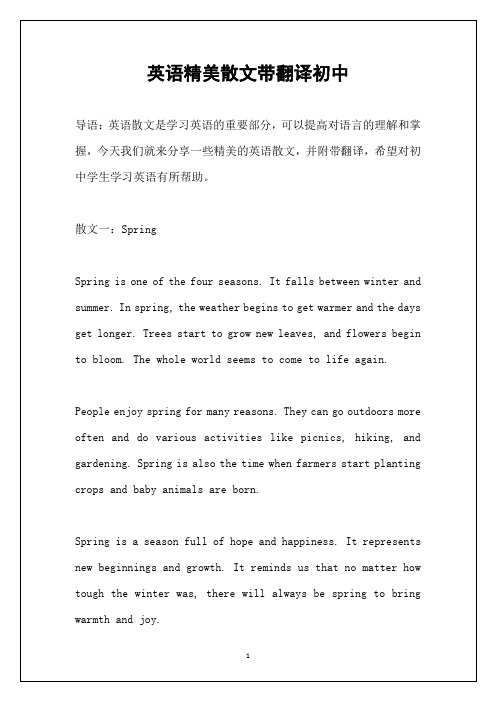
Kindness is a language that the deaf can hear and the blind can see. It has the power to break down barriers and bring people together. Kindness can be as simple as a smile, a kind word, or a thoughtful gesture. It costs nothing, but it can mean everything to someone in need.
True friendship is built on trust, respect, and understanding. It is not about the quantity of time spent together, but the quality of those moments. It’s about sharing laughter, wiping away tears, and being there for each other no matter what.
春天
春天是四季之一,位于冬天和夏天之间。在春天,天气开始变暖,白天变长。树木开始长新叶,鲜花开始盛开。整个世界似乎重新变得生机勃勃。
人们喜欢春天有很多原因。他们可以更频繁地出门,进行野餐、远足和园艺等各种活动。春天也是农民开始种植庄稼和小动物出生的时候。
春天是充满希望和快乐的季节。它代表了新的开始和成长。它提醒我们,无论冬天有多么艰难,春天总会带来温暖和快乐。
在这个有时候不够善待的世界里,选择善待会产生巨大的影响。它能照亮某人的一天,修复一颗受伤的心,甚至改变某人的一生轨迹。因此,让我们共同努力,在我们所到之处传播善待。
林语堂英语作品
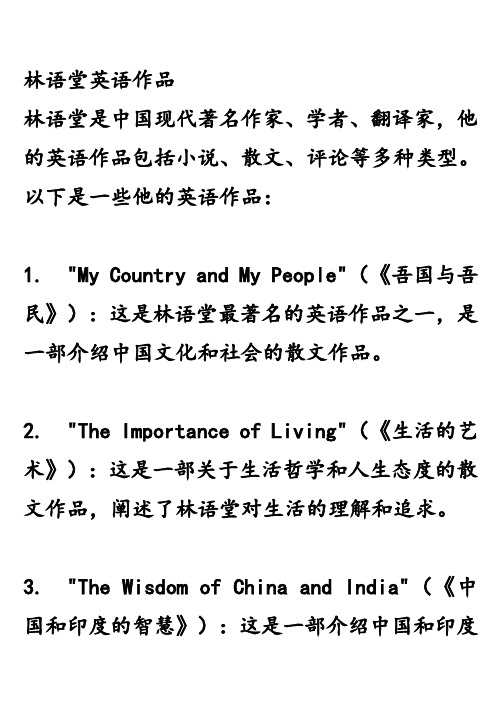
林语堂英语作品
林语堂是中国现代著名作家、学者、翻译家,他的英语作品包括小说、散文、评论等多种类型。
以下是一些他的英语作品:
1. "My Country and My People"(《吾国与吾民》):这是林语堂最著名的英语作品之一,是一部介绍中国文化和社会的散文作品。
2. "The Importance of Living"(《生活的艺术》):这是一部关于生活哲学和人生态度的散文作品,阐述了林语堂对生活的理解和追求。
3. "The Wisdom of China and India"(《中国和印度的智慧》):这是一部介绍中国和印度
哲学和文化的作品,探讨了两国文化的异同和相互影响。
4. "A History of the Press and Public Opinion in China"(《中国报业与舆论史》):这是一部关于中国报业和舆论发展的历史著作,介绍了中国报业的起源、发展和影响。
5. "The Moment in Peking"(《京华烟云》):这是一部长篇小说,讲述了中国近代历史上的一些重要事件和人物,反映了中国社会的变迁和人民的生活。
这些作品展示了林语堂的文学才华和对中国文化的深刻理解,对中国文化的传播和推广起到了
积极的作用。
2016翻译硕士复习资料:英译中国现代散文选(10)
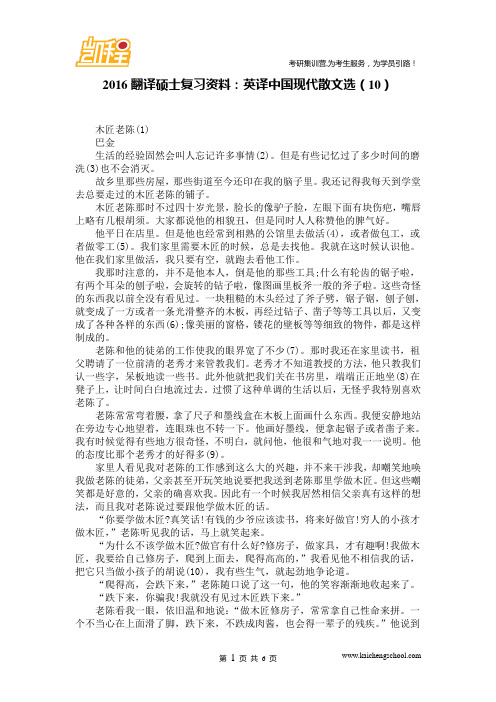
2016翻译硕士复习资料:英译中国现代散文选(10)木匠老陈(1)巴金生活的经验固然会叫人忘记许多事情(2)。
但是有些记忆过了多少时间的磨洗(3)也不会消灭。
故乡里那些房屋,那些街道至今还印在我的脑子里。
我还记得我每天到学堂去总要走过的木匠老陈的铺子。
木匠老陈那时不过四十岁光景,脸长的像驴子脸,左眼下面有块伤疤,嘴唇上略有几根胡须。
大家都说他的相貌丑,但是同时人人称赞他的脾气好。
他平日在店里。
但是他也经常到相熟的公馆里去做活(4),或者做包工,或者做零工(5)。
我们家里需要木匠的时候,总是去找他。
我就在这时候认识他。
他在我们家里做活,我只要有空,就跑去看他工作。
我那时注意的,并不是他本人,倒是他的那些工具;什么有轮齿的锯子啦,有两个耳朵的刨子啦,会旋转的钻子啦,像图画里板斧一般的斧子啦。
这些奇怪的东西我以前全没有看见过。
一块粗糙的木头经过了斧子劈,锯子锯,刨子刨,就变成了一方或者一条光滑整齐的木板,再经过钻子、凿子等等工具以后,又变成了各种各样的东西(6);像美丽的窗格,镂花的壁板等等细致的物件,都是这样制成的。
老陈和他的徒弟的工作使我的眼界宽了不少(7)。
那时我还在家里读书,祖父聘请了一位前清的老秀才来管教我们。
老秀才不知道教授的方法,他只教我们认一些字,呆板地读一些书。
此外他就把我们关在书房里,端端正正地坐(8)在凳子上,让时间白白地流过去。
过惯了这种单调的生活以后,无怪乎我特别喜欢老陈了。
老陈常常弯着腰,拿了尺子和墨线盒在木板上面画什么东西。
我便安静地站在旁边专心地望着,连眼珠也不转一下。
他画好墨线,便拿起锯子或者凿子来。
我有时候觉得有些地方很奇怪,不明白,就问他,他很和气地对我一一说明。
他的态度比那个老秀才的好得多(9)。
家里人看见我对老陈的工作感到这么大的兴趣,并不来干涉我,却嘲笑地唤我做老陈的徒弟,父亲甚至开玩笑地说要把我送到老陈那里学做木匠。
但这些嘲笑都是好意的,父亲的确喜欢我。
因此有一个时候我居然相信父亲真有这样的想法,而且我对老陈说过要跟他学做木匠的话。
文学英语翻译:张培基英译散文《哭》
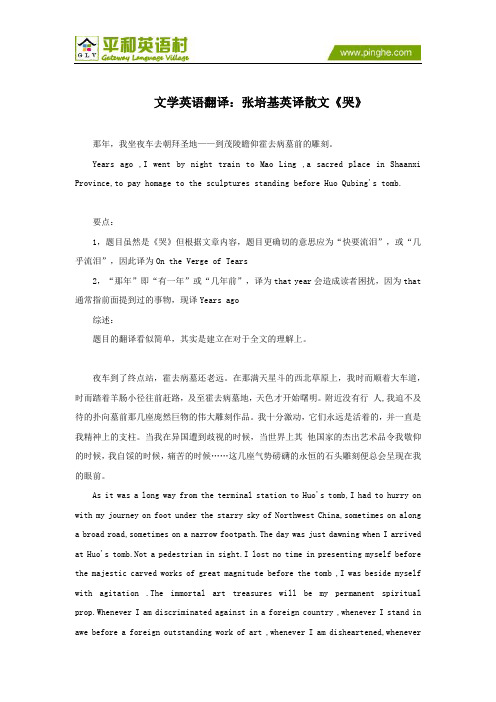
文学英语翻译:张培基英译散文《哭》那年,我坐夜车去朝拜圣地——到茂陵瞻仰霍去病墓前的雕刻。
Years ago ,I went by night train to Mao Ling ,a sacred place in Shaanxi Province,to pay homage to the sculptures standing before Huo Qubing's tomb.要点:1,题目虽然是《哭》但根据文章内容,题目更确切的意思应为“快要流泪”,或“几乎流泪”,因此译为On the Verge of Tears2,“那年”即“有一年”或“几年前”,译为that year会造成读者困扰,因为that 通常指前面提到过的事物,现译Years ago综述:题目的翻译看似简单,其实是建立在对于全文的理解上。
夜车到了终点站,霍去病墓还老远。
在那满天星斗的西北草原上,我时而顺着大车道,时而踏着羊肠小径往前赶路,及至霍去病墓地,天色才开始曙明。
附近没有行人,我迫不及待的扑向墓前那几座庞然巨物的伟大雕刻作品。
我十分激动,它们永远是活着的,并一直是我精神上的支柱。
当我在异国遭到歧视的时候,当世界上其他国家的杰出艺术品令我敬仰的时候,我自馁的时候,痛苦的时候……这几座气势磅礴的永恒的石头雕刻便总会呈现在我的眼前。
As it was a long way from the terminal station to Huo's tomb,I had to hurry on with my journey on foot under the starry sky of Northwest China,sometimes on along a broad road,sometimes on a narrow footpath.The day was just dawning when I arrived at Huo's tomb.Not a pedestrian in sight.I lost no time in presenting myself before the majestic carved works of great magnitude before the tomb ,I was beside myself with agitation .The immortal art treasures will be my permanent spiritual prop.Whenever I am discriminated against in a foreign country ,whenever I stand in awe before a foreign outstanding work of art ,whenever I am disheartened,wheneverI suffer agony … these imperishable stone carvings of amazing grandeur will inevitably appear in my minds eye.要点:1,“夜车到了终点站,霍去病墓还老远。
优美英语散文诗带翻译
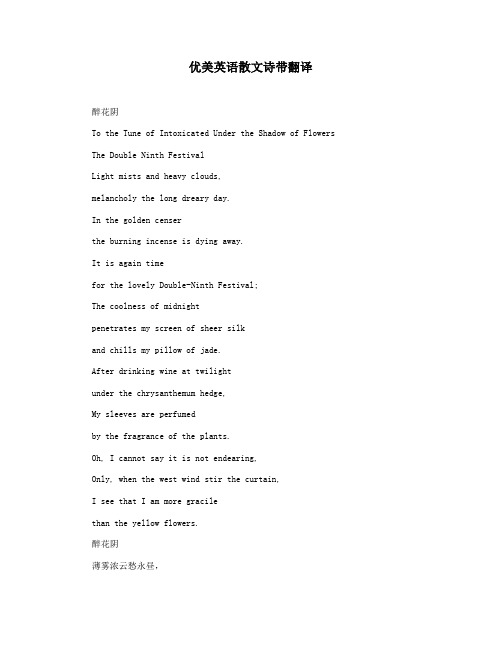
优美英语散文诗带翻译醉花阴To the Tune of Intoxicated Under the Shadow of Flowers The Double Ninth FestivalLight mists and heavy clouds,melancholy the long dreary day.In the golden censerthe burning incense is dying away.It is again timefor the lovely Double-Ninth Festival;The coolness of midnightpenetrates my screen of sheer silkand chills my pillow of jade.After drinking wine at twilightunder the chrysanthemum hedge,My sleeves are perfumedby the fragrance of the plants.Oh, I cannot say it is not endearing,Only, when the west wind stir the curtain,I see that I am more gracilethan the yellow flowers.醉花阴薄雾浓云愁永昼,瑞脑销金兽。
佳节又重阳,玉枕纱橱,半夜凉初透。
东篱把酒黄昏后,有暗香盈袖。
莫道不消魂,帘卷西风,人比黄花瘦!初相遇 The Frst EncounterThe Frst EncounterThe lyric lad intones under the moonCan I have a chance to meet you, I croon If it were a love from the love divineI would cherish you, and cherish you fine I read your solitude in your heart sole I see your loneliness deep in your soul If I were in my former lifeA lilac in the rainI drooped low, for youIf I were in my present lifeA poplar in the windI stood high, for youShould mountains have no peeksShould terrains have no cracksI would not part from you初相遇月下吟诗的少年怎会让我遇见你若是上天的旨意我会好好珍惜你读你的寂寞在心底懂你的孤独于魂里若前世我是一株雨中的紫丁香忧郁,为你若今世我是一棵风中的小白杨挺拔,为你哪怕山无棱角哪怕地无裂痕也不与你别离我怕背叛但我更怕真情I Fear True Love More Than Betrayal典裘沽酒by Dianqiu Gujiu我怕背叛,但我更怕真情背叛只是一把刀子它能杀死一头猪最多只能砍断我的一只手擘I fear betrayal yet I more fear true lovebetrayal is just a knife that can kill a pigand at most can only cut one of my arms我怕背叛,但我更怕真情因为真情是一个陷井能陷进一头猛兽也能陷进我的全部I fear betrayal yet I more fear true lovefor true love is a trap that can trap a beastand can still trap everything of my lifeSpring春天I don’t know what kind of fan spring useto fan green the grass to fan red the flowersI don’t know what kind of comb spring useto comb gardens and streets into beautiful sceneriesI only know in my gardena splendid rose is bloomingat the most eye-catching spoton the street a greeting floatis coming from the direction of bird flightO spring is so sweet and charmingI want to be the pide of spring不知春天用什么扇子扇绿了草扇红了花不知春天用什么梳子梳美了花园和街道只看到花园里一朵鲜丽的玫瑰开在最抢眼的地方街道上一辆迎新的彩车来自鸟儿飞来的方向哦春天如此娇媚我也想当春天的新娘走过柳园 Down By the Salley GardenDown by the salley gardens my love and I did meet;在莎莉花园深处,吾爱与我曾经相遇。
高考英语美文赏析: 吴冠中《太阳》- 摘自张培基《英译中国散文选》

《太阳》吴冠中The SunWu Guanzhong昨天,小公园里撒满了阳光,孩子们、老人们,喜洋洋一大群。
今天,太阳不见了,阴冷阴冷的冬天,像要下雪了。
公园里消失了人群,只有一个人裹着大衣低头独自行走,太阳的消失没有影响他独自行走,似乎他心中本来就没有太阳。
Yesterday, the small park was bathed in sunshine and lots of kids and elderly folks there enjoyed themselves very much. Today, the sun has disappeared. It is a cold and gloomy winter day and looks like snow. The park is deserted except for a solitary walker wrapped in an overcoat with his head bent low. The disappearance of the sun does affect his solitary walk at all. It seems that there is no sun in his heart.要点:1,“小公园里撒满了阳光”即“小公园沐浴在阳光下”译为the small park was bathed in sunshine,be bathed in形象地再现了当时的情形,《张》中还给出了另一种译法,Yesterday, lots of kids and elderly folks enjoyed themselves very much in the sun drenched small park.2,“只有一个人裹着大衣低头独自行走”多动词句,此处译者巧妙地将“独自行走”转译为名词walker,大大精简了句式,相似的例子还有《古城》中“那是一只灰色的铁鸟。
朱自清的《荷塘月色》英语翻译
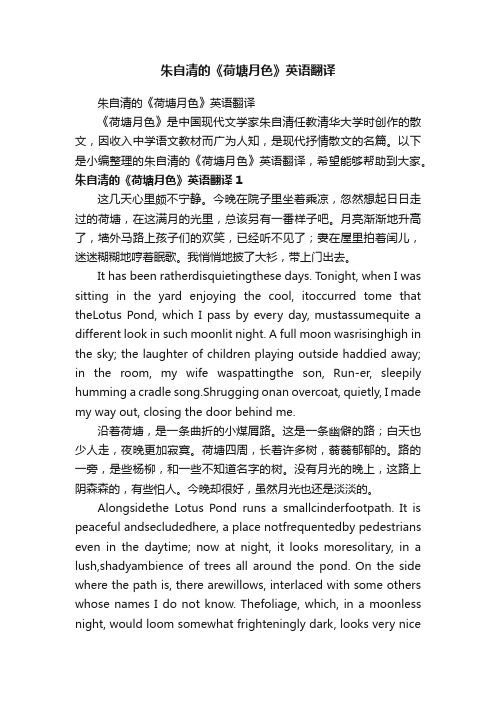
朱自清的《荷塘月色》英语翻译朱自清的《荷塘月色》英语翻译《荷塘月色》是中国现代文学家朱自清任教清华大学时创作的散文,因收入中学语文教材而广为人知,是现代抒情散文的名篇。
以下是小编整理的朱自清的《荷塘月色》英语翻译,希望能够帮助到大家。
朱自清的《荷塘月色》英语翻译1这几天心里颇不宁静。
今晚在院子里坐着乘凉,忽然想起日日走过的荷塘,在这满月的光里,总该另有一番样子吧。
月亮渐渐地升高了,墙外马路上孩子们的欢笑,已经听不见了;妻在屋里拍着闰儿,迷迷糊糊地哼着眠歌。
我悄悄地披了大衫,带上门出去。
It has been ratherdisquietingthese days. Tonight, when I was sitting in the yard enjoying the cool, itoccurred tome that theLotus Pond, which I pass by every day, mustassumequite a different look in such moonlit night. A full moon wasrisinghigh in the sky; the laughter of children playing outside haddied away; in the room, my wife waspattingthe son, Run-er, sleepily humming a cradle song.Shrugging onan overcoat, quietly, I made my way out, closing the door behind me.沿着荷塘,是一条曲折的小煤屑路。
这是一条幽僻的路;白天也少人走,夜晚更加寂寞。
荷塘四周,长着许多树,蓊蓊郁郁的。
路的一旁,是些杨柳,和一些不知道名字的树。
没有月光的晚上,这路上阴森森的,有些怕人。
- 1、下载文档前请自行甄别文档内容的完整性,平台不提供额外的编辑、内容补充、找答案等附加服务。
- 2、"仅部分预览"的文档,不可在线预览部分如存在完整性等问题,可反馈申请退款(可完整预览的文档不适用该条件!)。
- 3、如文档侵犯您的权益,请联系客服反馈,我们会尽快为您处理(人工客服工作时间:9:00-18:30)。
中国散文的英语翻译阅读导读:我根据大家的需要整理了一份关于《中国散文的英语翻译阅读》的内容,具体内容:阅读是人们获取信息的重要途径,也是语言教学的重点,阅读能力的提高,有利于听、说、读、写综合能力的培养。
下面是我带来的,欢迎阅读!篇一爱梦想的羞怯女孩A Sh...阅读是人们获取信息的重要途径,也是语言教学的重点,阅读能力的提高,有利于听、说、读、写综合能力的培养。
下面是我带来的,欢迎阅读!篇一爱梦想的羞怯女孩A Shy Dreamer在美Zai Mei我们宿舍里没有穿衣镜,饭厅门口倒是有一面。
每当我穿上一件漂亮的新连衣裙,我就禁不住暗暗地想往镜子里瞧瞧自己。
但总是在要去瞧的时候就感到特别不自在而踉跄离去——总是在关键时刻打了退堂鼓。
Our bedroom has no full-length mirror. There is one at the canteen entrance. I always cherish a secret desire to take a peep before it at myself in a beautiful new dress. However, each time when it comes to the fulfillment, I get seized with such an uneasiness that I literally stagger away—backing out at the critical moment.我就是这么羞怯,简直羞怯得不可救药!Shy I am, so helplessly!我从小就对自己没有信心,这是问题的根子。
这种情绪使我受到一点点表扬都会难为情,使我怎么也说不出一个"不"字,也使我不敢向父母多要一分钱。
此外,这种缺乏的情况也影响了我对钢琴的热爱。
At the root of it is my difference by which I have been enslaved since childhood. It embarrasses me at the mildest flattery, crushes my utmost efforts to say "no", and prevents me from asking my parents for one cent more than necessary. Among other things, diffidence has wormed it way into my love piano.那是我14岁的时候,有一具星期天的早晨,我被一阵唱赞美诗的歌声唤醒。
我循着这上帝的召唤来到附近的一所教堂,一进教堂我就被那钢琴的乐音吸引住了,简直不能自拔。
可是我父母哪儿买得起钢琴呀。
更糟糕的是,据说钢琴家都有音乐细胞,是遗传的;我想我父亲是工程师,母亲是技术员,哪会遗传什么音乐细胞呀。
可是好多天我脑子里尽想这些,我是在梦想了。
At the age of 14, one Sunday morning, I was woken up by a resounding hymn. Tracing that call of God into a neighbouring church, I found myself inexorably attracted by the melody of a piano—something beyond the means of my parents. To make it worse, people say a pianist is supposed to have music in the blood, but I believe I had none from my engineer father and technician mother. For days on end, Ikept thinking of nothing else. I had a dream.我不是做发财的梦。
为了发财我的几个好朋友都下海了,当了个体商贩。
她们手指上戴的金戒指脖子上戴的精美项链有时也让我看得眼花缭乱,但是透过这些东西我仿佛看见她们也有难言之隐,使我对这种发财狂望而生畏退避三舍。
失望之余,我孤独自处,被缺乏自信的情绪沉重地笼罩着,什么也干不了,只好转向梦想求得安慰,求得勇气来好高骛远地希冀那得不到的东西。
我深信我要想买得起昂贵物品(对我来说,那就是钢琴),首先必须在学业上求上进,力求学历尽量高些。
It wasnt a dream after gold, which enticed some of my close friends to engage in business as a self-employed trader or a street pedlar.I was sometimes dazzled by their gold rings or elegant necklaces behind which, however, I seemed to catch sight of skeletons in their cupboards and was frightened away from the craze for fortune. Out of despair, I retreated into seclusion, diffidence weighing heavy on me. I could do nothing but turn to my dream for comfort, for courage to aim high and wish for the impossible. I was convinced that before I could afford anything expensive(to me, it was a piano), I should climb up the academic ladder as high as possible.这以后的九个年头,为了保持求学(尤其是英语学习)的高昂斗志,我压抑着对音乐的朦胧向往。
我的这番努力取得了丰硕成果,我在家乡读完了中学和大学,都很顺利。
我还考上了首都北京的一家名牌大学读第二学位。
当我接到通知书时我真感动得热泪盈眶了。
我懂英语,我知道这就是我的本钱,我可以和有钢琴的人进行互助,我教他英语他让我钢琴。
For the next nine years I carefully smothered my hazy aspiration for music to keep aflame my quest for learning, especially in English studies. My efforts were so rewarding that I went successfully through high school and college in my hometown. When I received the admission notice for a second degree course at a prestigious university in Beijing, the national capital, tears welled up in my eyes. I knew my command of English was my asset, for I might make a deal with a pianist who would give me across to his piano in exchange for English lessons.这个愿望实现了!And that has come true!时至今日,每当我手指触及雪白的琴键,准备弹一曲时,仍然感到羞怯。
我深知自己音乐天赋有限,但我这个爱梦想的羞怯女孩却找到了一条成功之路,那就是竭尽一切努力梦想成真。
To this day whenever I lay my fingers on the snowwhite keyboard, ready for a melody, I still feel shy. I am quite aware of my limited music talent, but as a shy dreamer I have found my way to success—making every effort to turn a dream into reality.篇二永远的憧憬和追求My Longing and Yearning萧红Xiao Hong1991年,在一个小县城里边,我生在一个小地主的家里。
那县城差不多就是中国的最东最北部——黑龙江省——所以一年之中,倒有四个月飘着白雪。
In 1911 I was bom into a small landlord family in a small county town in Helongjiang—Chinas farnortheastern province where it snowed for four months of the year.父亲常常为着贪婪而失掉了人性。
他对待仆人,对待自己的儿女,以及对待我的祖父都是同样的吝啬而疏远,甚至于无情。
Father was almost inhumanly avaricious. To his servants, his children and even his own father,he was just as miserly and indifferent, or heartless for tha matter.有一次,为着房屋租金的事情,父亲把房客的全套的马车赶了过来。
房客的家属们哭着诉说着,向我的祖父跪了下来,于是祖父把两匹棕色的马从车上解下来还了回去。
为着这匹马,父亲向祖父起着终夜的争吵。
"两匹马,咱们是算不了什么的,穷人,这匹马就是命根。
"祖父这样说着,而父亲还是争吵。
a tenant failed to pay his rent, Father detained his cart and horses. Thetenants family knelt in front of Grandpa, pleading for mercy with tears in their eyes. Grandpaunharnessed the two brown horses from the cart and gave them back to the tenant. OverthisFather wrangled with him far the whole night. "Two horses dont mean much to us," saidGrandpa, "but they are the life-blood to the poor." Father bickered on.九岁时,母亲死去。
